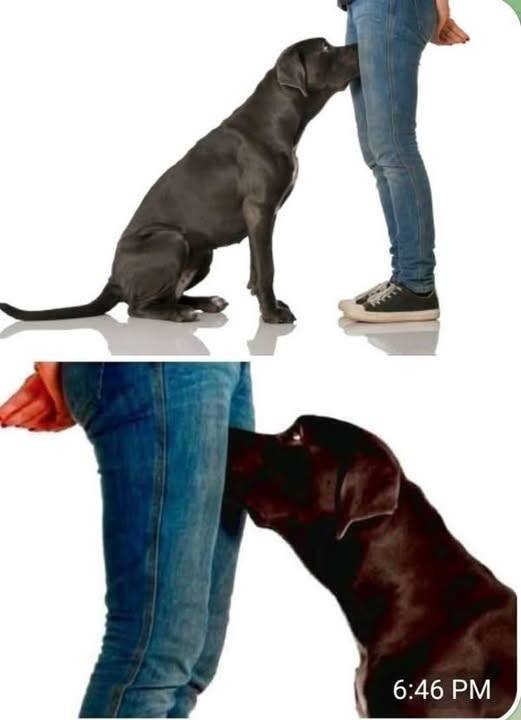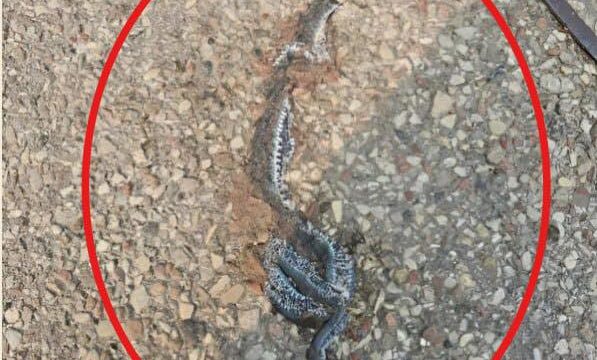If you’ve ever had your dog come up and give your crotch a thorough sniff, especially when guests are around, you know how uncomfortable it can feel, but before you get embarrassed or push your pup away, it’s important to understand there’s a real reason behind this behavior—and it’s not nearly as strange as it seems.

Dogs explore the world primarily through their noses, unlike humans who mostly rely on sight and sound, and their sense of smell is incredibly powerful, with about 220 million scent receptors compared to our modest 5 million, meaning they can detect scents that we aren’t even aware of. So when your dog sticks its nose between your legs, it isn’t being rude or inappropriate—it’s simply being a dog and doing what comes naturally. Veterinarian Jennifer Sperry explained to Rover.com that dogs are particularly drawn to areas where human scent is the strongest, and your crotch is filled with apocrine sweat glands, which produce a scent completely unique to you. While these glands are also found in your armpits and chest, the crotch area is much more accessible to dogs, especially medium or large breeds.
To a dog, your groin area acts almost like a personal identification card, giving them clues about your gender, your mood, your health status, and even whether you’ve interacted with other animals recently, which is the same reason why dogs often sniff each other’s rear ends as a form of greeting—it’s just how they collect information, and there’s nothing weird about it from their perspective. If your dog tends to sniff at your friends or family members too, it’s simply trying to figure out who these people are; it’s their version of a handshake, although admittedly a lot more invasive than what we humans are used to.
If this behavior bothers you or makes your guests feel uneasy, the good news is that you can teach your dog a better way to greet people without having to scold or punish them. Instead of getting upset, it’s much more effective to redirect your dog’s curiosity in positive ways. Punishment doesn’t usually work because dogs don’t connect the dots between their natural behaviors and your frustration, and negative reactions can actually create stress or fear.
A better strategy is to engage their incredible noses through activities like snuffle mats, which you can sprinkle with treats for them to sniff out, puzzle toys that keep their brains working, scent work games where you hide treats around the house for them to find, and sniffer walks where your dog gets to lead the way and stop to explore smells along the journey. These alternatives allow your dog to fulfill its natural sniffing instincts in a way that doesn’t involve invading someone’s personal space. Another helpful tactic is to train your dog to greet people more politely, and teaching a simple “sit” command when guests arrive can work wonders, according to Dr. Sperry, who recommends using positive reinforcement to encourage good habits. If you want to take it even further and have a little fun with it, you can teach your dog to give a high-five instead of sniffing—start by practicing the high-five trick when it’s just the two of you with no distractions, then invite a friend over and when your dog gets excited, cue the high-five and reward it with a treat when it responds correctly. This way, your dog becomes focused on showing off its new trick rather than trying to gather scent information. Most importantly, it’s crucial to remember that when your dog sniffs your crotch—or anyone else’s—it’s not being disrespectful, it’s simply following its natural instincts, and in fact, this behavior shows that your dog is confident, curious, and comfortable in its environment. If it happens often, it’s a sign that your dog feels safe enough to explore the world through its nose. Still, if you or your guests aren’t thrilled about it, guiding your dog toward more appropriate behaviors with patience and consistency can make all the difference. By understanding why your dog acts this way, you not only prevent unnecessary frustration but also strengthen the bond you share. So the next time your dog gets a little nosey, just remember—it’s not personal, it’s just their natural way of learning about the world, one sniff at a time.





